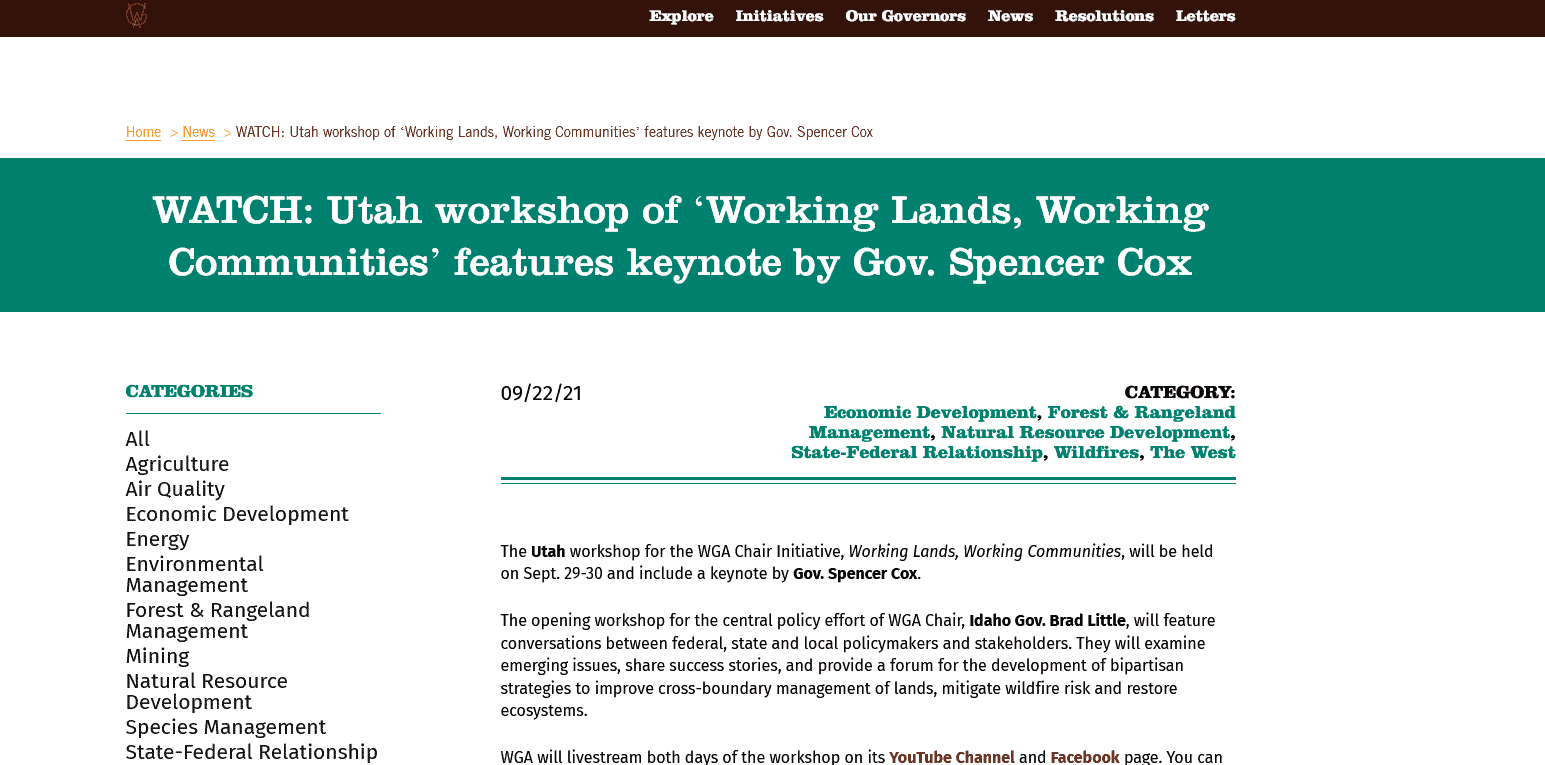The Utah workshop for the WGA (Western Governors’ Association) Chair Initiative, Working Lands, Working Communities, will be held on Sept. 29-30 and include a keynote by Gov. Spencer Cox.
The opening workshop for the central policy effort of WGA Chair, Idaho Gov. Brad Little, will feature conversations between federal, state and local policymakers and stakeholders. They will examine emerging issues, share success stories, and provide a forum for the development of bipartisan strategies to improve cross-boundary management of lands, mitigate wildfire risk and restore ecosystems.
WGA will livestream both days of the workshop on its YouTube Channel and Facebook page. You can also follow along via live tweets from WGA’s Twitter account. To view the sessions on YouTube, click on the links below at the scheduled times. Register to watch.
All times are Mountain Daylight Time.
There’s also a Colorado workshop on October 7-8.
As background for these sessions, WGA did a survey. There’s much interesting and discussable findings here, I’ll just highlight the “proliferation and lack of connection and possibly utility of collected data” one.
Question 2: How can federal agencies more effectively collect and utilize local‐ or state‐level data – including quantitative and qualitative information – in decision‐making processes that impact western working lands?
According to survey respondents, local data is often available, but lack of staff and funding capacity, partnerships, and communication between agencies creates complications in considering all data, assuring data is high quality and reliable, and fully capturing the story the data tells. Additionally, the lack of established standards for data collection and processing can lead to difficulty integrating data from multiple sources.
The lack of data standards and consistency was a reoccurring theme across multiple responses. Established standards would allow amalgamated data from non-governmental, local, state and federal sources to be efficiently compared and utilized. Varying methods of collection and processing lead to agencies not accessing or using potentially valuable data without creating new systems or procedures. Many respondents noted the need to update databases and database software to reflect new data, science and the use of modern software tools.
Other respondents noted that there needs to be agreement on what data is important for a particular end goal. Additionally, that data needs to be translated into an understandable narrative that provides useable, useful information to the reader. Due to lack of data standards, data may be shared, but other groups may not know how to properly interpret that data. Respondents specifically noted that State Forest Action Plans and the Shared Wildfire Risk Mitigation Tool are being underutilized for developing shared priorities, and could be excellent systems for quantifying project accomplishments.
Lack of capacity for adequate data collection was another common response throughout the survey. Some respondents explained their staff lack the necessary training to use data collection equipment and software, while others simply lack staff members and resources altogether. Building a chain of partnerships between every level of group or agency collecting data was a proffered solution. State agency resources may allow local groups to increase capacity for effective data collection, and in turn, states could work with federal agencies to provide collected data. These partnerships could include NGOs and universities engaged in relevant research as well as private landowners. Often, members of one organization or agency don’t even know what data has already been collected and processed by another.
I bolded the “agreement on data” because that seems to be an ongoing theme..as well as “coordination” of data; some us us remember discussions of why BLM and the FS couldn’t collect the same data. I think that was in the 1980’s…

Re natural resources, especially wildlife, data: There are 2 “conclusions” made from such data. 1) What happened? 2) What caused it to happen? Much data is of poor quality, with no variance measured and resulting low precision (reliability). Much is trend data that, if correctly describing what happened, is at least up to 5 years old before there can be a reliable trend. So much for what happened. — Causation is mostly guesswork. Sometimes influenced by correlations that could be unrelated. Sometimes accepted because we want it to be true. (“See, our management was successful, as predicted.”) Evaluation of cause-effect will be increased to the extent that “research” (misnomer) qualifications of replication, randomness, and controls are established before setting our to test anything. (The scientific method should be used in “management” not just in “research”). JAB
Be sure to tell us who volunteered to stop doing it their way and start doing it someone else’s way.